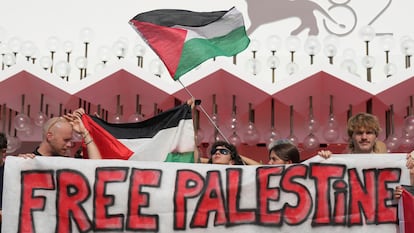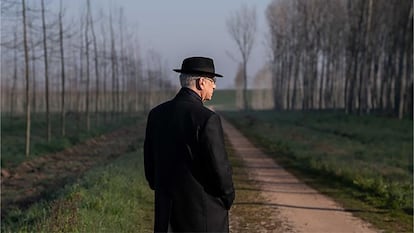Paolo Sorrentino's 'La Gracia' opens the Venice Film Festival with emotion, laughter, and moral dilemmas.

Lately, when he prays, Mariano de Santis falls asleep. And he never dreams. It's impossible for a man like that to indulge in fantasies. A jurist, author of a celebrated 2,046-page private law manual, now President of the Italian Republic: pure concreteness. It's not for nothing that he's nicknamed Cemento Armato (Reinforced Concrete). The weeks pass, the end of his term approaches, like the sunset. But he doesn't flinch. He refuses to make decisions. In reality, he barely lives. "I am the most boring plot I know," he says in the film. The only thing that moves him is returning to the first time he saw his beloved Aurora, who died eight years ago. He remembers her walking, he says her feet lifted off the ground. Blessed lightness: each day it seems to fade a little more. For the protagonist of La Gracia , by Paolo Sorrentino, which opened the Venice Film Festival this Wednesday. But also on the other side of the screen, in the seats. For at least two hours, viewers laughed, cried, and reflected. They forgot their sorrows, perhaps even felt a little lighter. Blessed cinema.
A huge mystery surrounded the Italian director's new work, which will be released in Spain on January 16. It had only been announced that it would be performed by Toni Servillo, in his seventh collaboration with Sorrentino. And that it would be about "love." True. Now we also know there's much more. It speaks of grief, obsession, uncertainty, and forgiveness; of euthanasia and gender-based violence; of trying, moving forward, or stagnating; of sensitivity, the same sensitivity that permeates the entire film. "Whose days are these?" the daughter asks the president. And, incidentally, the audience. The film astonishes because it leaves a lasting impression, it stays on the surface, but it also elicits the occasional laugh. The sublime and the ridiculous, the fascinating alliance that is the hallmark of the film. "I don't believe it," one attendee at the press screening exclaimed, faced with the peculiar portrayal of the Pope in the film. He repeated it on two other occasions. The first round of applause lasted only 10 minutes. In the end there was a second, longer one.
A third, even larger, voice was heard in the press room when the filmmaker and his team appeared . “The film was born from an event: I read that Sergio Mattarella [the current president of the Italian Republic] granted clemency to a man who killed his wife, who was suffering from Alzheimer's. For years, I've thought that the moral dilemma is a formidable narrative engine,” Sorrentino stated. From there, he filled the entire film with humor, far beyond its concrete meaning. And he placed on screen a politician he increasingly misses in real life: “He loves the law and values that politics should embody and that seem to be missing in many, although they can be glimpsed in our president of the Republic.” There were more hooks with current events: Sorrentino and Servillo did not reveal who inspired them for the character, and the filmmaker hopes his film will draw attention back to euthanasia, the subject of yet another draft law that has languished unfinished business in the Italian Parliament. Of course, the most topical issue of all was also discussed: the Israeli massacre in Gaza.

Sorrentino was asked about Mubi, one of the film's distributors, which was criticized for accepting investments from a company that also invests in an Israeli startup specializing in defense technologies. The director bounced the question back to a company representative in the audience, who declined to answer. When, a couple of hours earlier, the press sought to know the opinion of filmmaker Alexander Payne, president of the competition jury, on Palestine, he also didn't take the bait: he passed the baton to the festival director, Alberto Barbera. It's clear the topic will return. Because the Mostra is starting, but the massacre in Gaza continues . Hence, the V4P (Venice for Palestine) movement, led by some 1,500 names in Italian and international cinema—including Marco Bellocchio, Matteo Garrone, Alice Rohrwacher, Ken Loach, and Céline Sciamma—called on the festival to more clearly condemn Israel and not invite Gal Gadot and Gerard Butler, actors who have positioned themselves in favor of the Netanyahu government . “The Venice Biennale [which organizes the festival] is the most important cultural institution in Italy, an open space for dialogue. Making political statements is not our job. We welcome everyone; we have never censored an artist, nor will we do so now. No one can doubt our attitude or believe that we are insensitive to what is happening,” Barbera responded to EL PAÍS on Tuesday.
Today, Wednesday, the artistic director cited the speeches from yesterday's pre-opening ceremony as another unequivocal sign of the festival's position. "This child's grave will be a monument to shame," said Pietrangelo Buttafuoco, president of the Biennale, at the gala, quoting Euripides. And Nandino Capovila, a priest expelled from Israel on August 2, spoke of a "genocide plan." The priest recalled the officially declared famine in Gaza, called for justice for the victims—both the 62,000 Palestinians and the 1,205 Israelis—and added: "This escalation breaks any principle of humanity, proportionality, and distinction." The world's oldest festival has seen wars, revolutions, and a pandemic. Its 82nd edition aims to be that of a hallucinatory flood of stars. But it is, of course, also that of Gaza . On Saturday, the Lido, the island where the Mostra is being held, will host a protest in support of Palestine. Today, it saw a preview, with some demonstrators demonstrating in front of the Palazzo del Cinema with flags and banners against "genocide."
Who knows how Venice will experience such a different parade from those it usually sees. The festival knows more about red carpets; about establishing legends, like Werner Herzog, who collects the Honorary Golden Lion today at the opening gala; or about discovering those who will one day become such. Right here, in 2001, Sorrentino began his journey, with the celebrated and restrained The Man with More . From there, he forged a highly personal trajectory: self-taught, always true to himself, unique, sometimes even too much so. A visionary who, paradoxically, dazzles most when he reins in his imagination. The Consequences of Love and The Diva are proof of this. The delicacy with which he recreated the death of his parents on screen in It Was the Hand of God , which won an award four years ago at the Mostra, is a masterclass in filmmaking. If such talent can be taught, or learned.

“Every film requires a style. In It Was the Hand of God, we set out to create fireworks and realized it had to be more restrained. That's also the case now,” said the director. However, Silvio and the Others , some episodes of The Young Pope series , and especially Parthenope, warn us that there is another Sorrentino: one who becomes baroque and, ultimately, vacuous. His masterpiece, The Great Beauty , stands out as a stupendous exception: a marvel both visual and narrative.
The grace , like its protagonist, is restrained. None of the empty aesthetic of Parthenopean. Nor of the immobility suffered by the young protagonist. A priori , few characters are as blocked as President Hormigón. And yet, his paralysis has much to tell, thanks also to a superb script. Sorrentino usually defines himself, above all, as "a writer." He has published novels, his films always come from his own pen. And in this case, he was especially inspired: quality, intelligence, irony, and depth. He is also known as a master in the use of music: confirmed. Now he even searches for possible soundtracks on Instagram, as he revealed at the press conference. The only one who disagreed turned out to be Toni Servillo, with a smile: "We've never argued. Only music divides us." The filmmaker is omnivorous. The actor, apparently, prefers classical music.
Perhaps La Gracia only deserves one justified criticism: a few more cuts, so as to keep the film to within two hours. Also because the film itself underlines the importance of the passage of time. Small things, in any case. Because, upon leaving the theater, pleasure, thoughts, and questions remained. After all, as the film says, La Gracia is "the beauty of doubt." At least one doubt is resolved: the Venice Film Festival has gotten off to a fantastic start.
EL PAÍS




